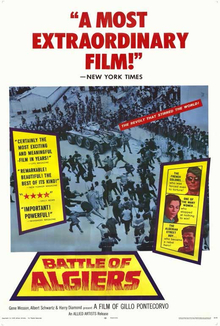 |
| Source: Wikipedia |
Case in point: in the 1950s, the French occupy Algeria in North Africa. The Arabs want the French to leave, the French want to stay. It gets bad. So bad you almost want to root for the terrorists.
We follow a delinquent draft-dodger who unwittingly bumbles into leading the National Liberation Front.
These Arab terrorists bomb the French. In retaliation, the French institute checkpoints, blockades, propaganda. Undeterred, the Arab ghetto harbors fugitives, goes on strike, and ululates. The unofficial war escalates into full-blown violence.
Hollywood loves explosions, but war-torn Africa isn't Hollywood. Bombs don’t make pretty fireballs; they create clouds of dust and rubble and maimed corpses. (The gore here never becomes gruesome, but it doesn't need to.)
The minimalist soundtrack reflects the situation. Low piano notes plunk like distant dynamite, drums click in regular rapid tempo like machine gun fire. And despite all the repetitive noise, nothing really goes anywhere.
The film drifts in a moral gray area, not just because it’s shot in black and white. The French are World War II veterans, and the Arabs are rabid underdogs. As the rebel ranks dwindle, the survivors suffer alone and persevere. As one character says, revolutions are hard to start, harder to sustain, and hardest to win.
A difficult watch, but oddly inspirational, the same way Greek tragedies and reality TV marathons make us want to become better people. Or should, anyhow.
Recommended for Arab haters (for some perspective), Francophiles (for more perspective), and the poor dupes who pray the U.N. will save us all.
120 minutes.
No comments:
Post a Comment